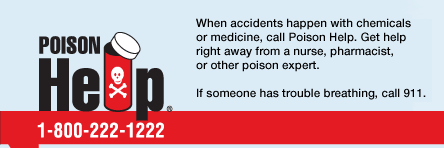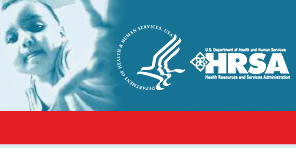

 |

|
Department of Health and Human Services Fall 2005 HRSA POISON CONTROL PROGRAM (PCP) UPDATE POISON HELP Program Highlights *The PCP congratulates the new Incentive Grant award recipients: - University of California San Francisco-San Francisco, CA *The Notice of Grant Awards (NGA) for the Financial Stabilization Grants has been disseminated electronically to all grantees. If you have not received your NGA, please contact your grants management specialist, whose name can be found on the grants management contact information sheet that was disseminated during the HRSA presentation at North American Congress of Clinical Toxicology (NACCT) meeting. If you did not receive a copy of the grants management contact information sheet and/or you need this information, you may contact Maxine Jones at 301-443-6192 or mjones@hrsa.gov. * The PCP has selected Widmeyer Communications (www.widmeyer.org) to implement the next phase of the Poison Help Campaign. The PCP will send out e-mails to keep grantees informed of campaign activities. Special thanks to Angel Bivens, Rose Ann Soloway and Ronica Farrar for their assistance in reviewing the proposals and assisting in the selection of the media campaign contractor. * The PCP has awarded a technical assistance contract to AAPCC for the purpose of providing technical assistance with the development and implementation of the Poison Help Campaign. In addition, AAPCC will be producing a bioterrorism preparedness educational program for poison centers to use in educating the public and healthcare providers. More information about the development of this project will be shared as it evolves. * The Patient Management Guidelines on Acetaminophen, Diphenhydramine and Beta Blockers are now available on the AAPCC web site at www.aapcc.org. * On August 15, the PCP hosted a Federal meeting in response to the IOM Report. The purpose of the meeting was to: 1) discuss the IOM Report, Forging a Poison Prevention and Control System" and the Federal Role in responding to recommendations; 2) examine IOM recommendation #11, regarding the availability of Toxic Exposure Surveillance System data; and 3) provide an opportunity to meet and discuss expanding Federal partnerships. The Federal agencies that sent representatives to the meeting include HRSA, CDC, CPSC, FDA, and EPA. Dr. Bernard Guyer, the Chair of the IOM Committee on Poison Prevention and Control, shared his thoughts about the committee and the Report recommendations. Carol Rubin (CDC) presented on the status of CDC's toxiocosurveillance efforts and their new cooperative agreement with the AAPCC. * The PCP funded 2 web casts for the poison center SPIs. The first web cast was held August 2, 2005 entitled, ìUnusual Cases, Part Iî. The presenter was Dr. Erica Liebelt from the Birmingham, AL PCC. There were a total of 57 online participants. The next web cast, entitled, ìUnusual Cases, Part IIî, will be held in 2006 at the end of February or the beginning of March. The PCP will keep poison centers posted on the specific dates of upcoming web casts. * Although the PCP has not scheduled a Stakeholder's Meeting for this year, we do value the input of stakeholders. At the last meeting in January of 2005, it was expressed that the PCP should expand its stakeholders group. We would like to do that and are working on mechanisms to expand the group. We have awarded a contract to a media firm to expand the Poison Help Campaign. We will be calling upon our stakeholders to provide input into the direction of the Campaign. Drug Identification During the North American Congress of Clinical Toxicology (NACCT) in Orlando, the PCC Technical Assistance and Resource Center (TARC) presented a poster entitled ìEstimating Drug Identification Calls from a Survey of Poison Control Centersî. Drug identification (DID) and the issue of whether PCCs should provide DID services have become a subject of considerable debate. Discussion at the NACCT poster session highlighted the potential impact a DID policy would have on a PCC's DID call volume and delivery of DID services to the public. Additional comments were focused on the development of an automated drug identification response system to address the drug information inquiries from consumers and reduce staff cost associated with DID services. Future development and discussion of this project will be posted in a future issue of this newsletter. HRSA's Office of Performance Review (OPR) will continue to conduct site visits, not audits. OPR serves as HRSA's focal point for reviewing and enhancing performance of HRSA supported programs within communities and States. OPR works with grantees to: 1. conduct grantee performance reviews, provide programmatic and business management assessments, recommendations, on-site technical assistance and best practice identification; 2. perform State and community strategic partnership reviews, examine individual and the collective effectiveness of HRSA-supported programs and facilitate collaboration in addressing priority health needs; 3. track regional and State trends in public health, health care and health policy, analyze the impact on HRSA supported programs; and 4. provide recommendations and input on HRSA and selected Departmental program designs, policies and initiatives. There will be a representative at the HRSA Poison Control Program Grantee Meeting to further explain OPR's purpose and answer questions. The American Medical Association Supports PCC Funding The American Medical Association (AMA) has developed a resolution supporting the IOM recommendations (from Forging a Poison Prevention and Control System) to federally fund poison centers. The AMA is a network designed to unite physicians nationwide to work on significant professional and public health issues. One of the ways the association achieves its mission is by policy development through the AMA House of Delegates. The AMA promotes their policies through Federal and State legislative processes, advocacy campaigns, and by having representatives participate in standard-setting and accreditation boards/committees. To view the AMA resolution on poison center funding, go to www.ama-assn.org/meetings/public/annual05/423a05.doc. The Pacific Institute for Research and Evaluation (PIRE), PCC Technical Assistance and Resource Center (TARC) provides technical assistance(TA) to PCCs on behalf of HRSA. TA is available in several areas including strategic planning, fundraising, health education development and enhancement, program evaluation, and media support. To request TA, PCCs may contact Stuart Swayze at 301-755-2794 or swayze@pire.org. Grantee Meeting Theme: Partnership Is Key Dates: February 8 & 9, 2006 Location: Wyndham Harbour Island Hotel, Tampa, FL * Help poison control centers (PCCs) establish and maintain stability; * Strengthen PCCs infrastructure; and * Foster collaboration amongst PCCs and other stakeholders. During the month November 2005, the HRSA PCP logistics contractor (McKing Consulting) will mail all grantees a pre-meeting package, including the agenda and hotel information. Maxine Jones, Public Health Analyst Shkeda Johnson, Public Health Analyst Visit the Adobe Reader Web site and follow the instructions to download the appropriate version of Adobe Reader for your operating system. |
|